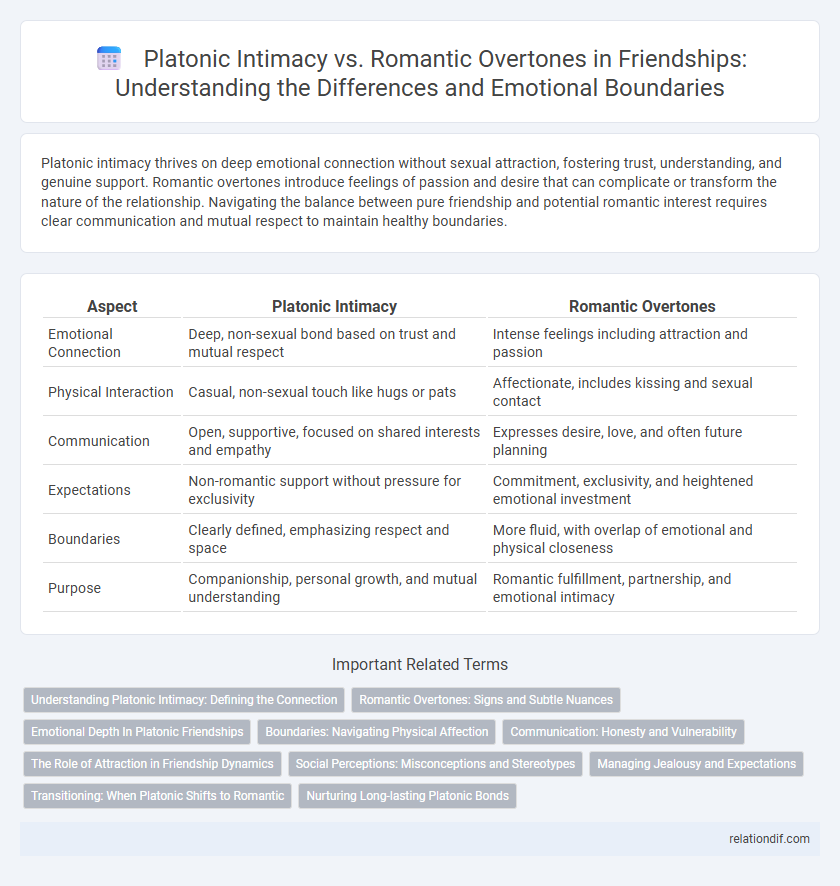Platonic intimacy thrives on deep emotional connection without sexual attraction, fostering trust, understanding, and genuine support. Romantic overtones introduce feelings of passion and desire that can complicate or transform the nature of the relationship. Navigating the balance between pure friendship and potential romantic interest requires clear communication and mutual respect to maintain healthy boundaries.
Table of Comparison
| Aspect | Platonic Intimacy | Romantic Overtones |
|---|---|---|
| Emotional Connection | Deep, non-sexual bond based on trust and mutual respect | Intense feelings including attraction and passion |
| Physical Interaction | Casual, non-sexual touch like hugs or pats | Affectionate, includes kissing and sexual contact |
| Communication | Open, supportive, focused on shared interests and empathy | Expresses desire, love, and often future planning |
| Expectations | Non-romantic support without pressure for exclusivity | Commitment, exclusivity, and heightened emotional investment |
| Boundaries | Clearly defined, emphasizing respect and space | More fluid, with overlap of emotional and physical closeness |
| Purpose | Companionship, personal growth, and mutual understanding | Romantic fulfillment, partnership, and emotional intimacy |
Understanding Platonic Intimacy: Defining the Connection
Platonic intimacy centers on deep emotional closeness and trust without romantic or sexual attraction, emphasizing shared values, mutual support, and open communication. This form of connection builds a foundation based on empathy, respect, and authentic vulnerability, allowing friends to feel truly understood and valued. Understanding platonic intimacy clarifies boundaries and nurtures meaningful relationships free from romantic overtones.
Romantic Overtones: Signs and Subtle Nuances
Romantic overtones in friendship often reveal themselves through subtle nuances such as lingering glances, increased physical touch, or a change in tone when discussing future plans together. These signs include moments of jealousy when attention is diverted elsewhere, heightened emotional vulnerability, and conversations that shift from casual to deeply personal or affectionate. Understanding these romantic cues helps distinguish between purely platonic intimacy and a developing romantic connection.
Emotional Depth In Platonic Friendships
Platonic friendships often exhibit profound emotional depth characterized by trust, empathy, and mutual understanding without romantic intentions. These connections foster a safe space for vulnerability and emotional support, strengthening the bond through shared experiences and genuine care. Unlike romantic relationships, platonic intimacy centers purely on emotional closeness, free from physical or romantic expectations.
Boundaries: Navigating Physical Affection
Platonic intimacy thrives on clear boundaries that respect personal space while allowing meaningful physical affection such as hugs or casual touches. Navigating these boundaries prevents romantic overtones from complicating the friendship, ensuring mutual comfort and trust. Establishing explicit communication about limits supports a balanced dynamic between affection and respect.
Communication: Honesty and Vulnerability
Effective communication in friendships thrives on honesty and vulnerability, fostering deep platonic intimacy without crossing into romantic overtones. Open dialogue about feelings and boundaries ensures mutual trust and emotional safety, strengthening the bond while maintaining clarity. Prioritizing authentic expression enables friends to connect profoundly without misinterpreting intentions as romantic.
The Role of Attraction in Friendship Dynamics
Attraction plays a complex role in friendship dynamics, often blurring the lines between platonic intimacy and romantic overtones. While platonic friendships thrive on emotional closeness and trust without sexual intention, the presence of mutual attraction can introduce ambiguous feelings and expectations. Understanding how attraction influences boundaries helps maintain healthy friendships by preventing misunderstandings and fostering clear communication.
Social Perceptions: Misconceptions and Stereotypes
Social perceptions often blur the lines between platonic intimacy and romantic overtones, leading to misconceptions that close friendships must have underlying romantic or sexual intentions. Stereotypes reinforce these misunderstandings by assuming emotional closeness between individuals of opposite genders signals romantic interest, which undermines the validity of purely platonic bonds. These societal biases can complicate friendships by imposing expectations that do not reflect the true nature of intimate, non-romantic connections.
Managing Jealousy and Expectations
Managing jealousy and expectations in platonic intimacy requires clear boundaries and open communication to prevent misunderstandings that often arise from romantic overtones. Recognizing the distinction between deep friendship and romantic involvement helps mitigate feelings of possessiveness and insecurity. Establishing mutual respect and transparency fosters trust, ensuring emotional needs are met without blurring the lines of the relationship.
Transitioning: When Platonic Shifts to Romantic
Platonic intimacy often lays a foundation of trust and emotional support that can naturally evolve into romantic feelings, signaling a pivotal transition in the relationship dynamic. Navigating this shift requires clear communication and mutual understanding to balance emotional vulnerability with the potential redefinition of boundaries. Research in relationship psychology highlights that recognizing subtle changes in interaction patterns, such as increased physical closeness or deeper personal disclosures, can indicate the progression from platonic to romantic involvement.
Nurturing Long-lasting Platonic Bonds
Nurturing long-lasting platonic bonds relies on deep emotional intimacy without romantic overtones, emphasizing trust, empathy, and open communication. Platonic intimacy fosters a secure connection through shared experiences and mutual support, distinct from the physical or romantic expectations often found in romantic relationships. Prioritizing respect for boundaries and genuine care strengthens these friendships, creating enduring, meaningful connections.
Platonic Intimacy vs Romantic Overtones Infographic

 relationdif.com
relationdif.com